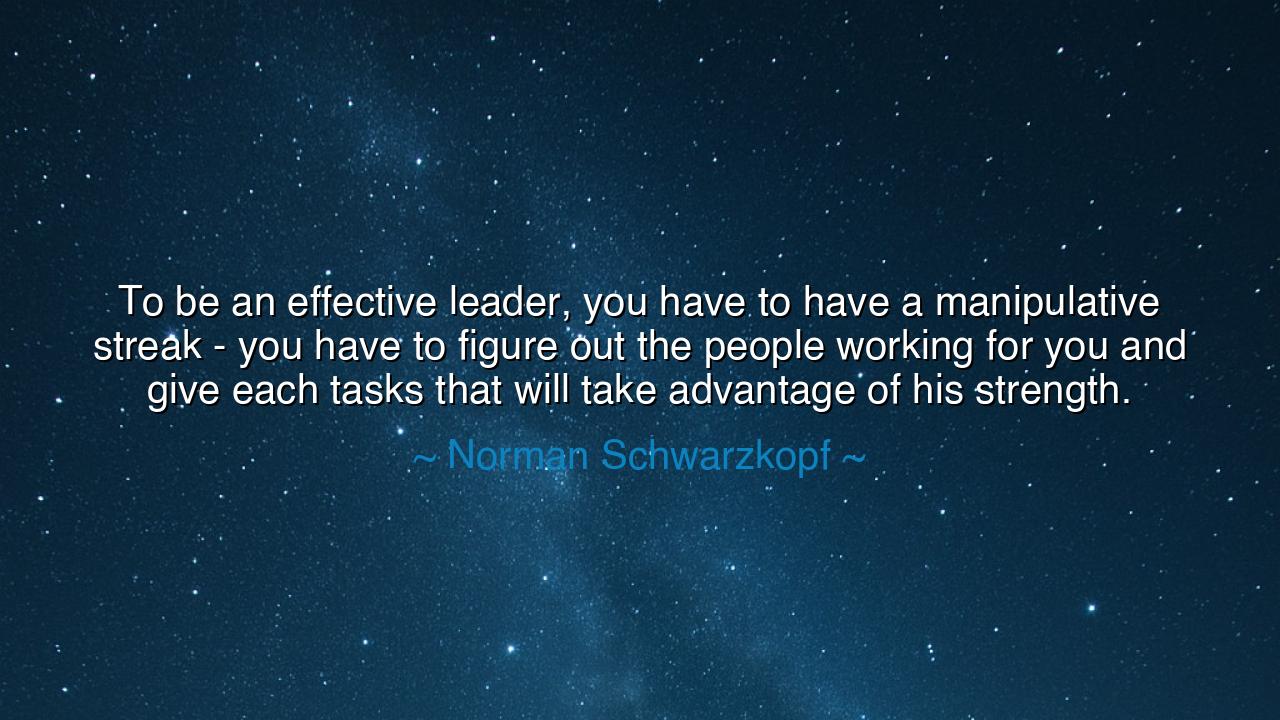
To be an effective leader, you have to have a manipulative
To be an effective leader, you have to have a manipulative streak - you have to figure out the people working for you and give each tasks that will take advantage of his strength.






Norman Schwarzkopf, the general who commanded with both firmness and humanity, once said: “To be an effective leader, you have to have a manipulative streak—you have to figure out the people working for you and give each tasks that will take advantage of his strength.” At first hearing, the word manipulative may sound dark, even unworthy of a noble leader. Yet Schwarzkopf, seasoned in the furnace of command, used the word not as deceit but as wisdom: the ability to discern the hidden gifts of others and direct them toward a greater purpose. His words remind us that leadership is not about wielding brute authority, but about unlocking the strength within every person under one’s charge.
The meaning of this teaching is clear. A leader is like a master craftsman who holds many tools; each tool is shaped for a different task, each with its unique edge and purpose. To treat every tool alike is folly. The wise craftsman knows which blade cuts wood, which file smooths stone, which hammer strikes iron. In the same way, a leader must discern the hearts, talents, and temperaments of those he leads. By doing so, he assigns tasks not blindly, but wisely, ensuring that each person’s strength is magnified for the sake of the whole.
The origin of this truth comes from Schwarzkopf’s long service as a commander during the Gulf War and throughout his military career. Leading men into battle required more than strategy on paper; it required intimate knowledge of soldiers—their fears, their skills, their hidden reserves of courage. A reckless commander who failed to match men to their strengths risked not only failure, but lives. But a leader who understood his soldiers and placed them where they could excel transformed ordinary men into a unified, unstoppable force. Thus, Schwarzkopf’s “manipulative streak” was the art of seeing potential and directing it with purpose.
History is filled with examples that confirm this wisdom. Consider Alexander the Great, who studied his generals closely and assigned each according to his unique abilities. He entrusted Parmenion with diplomacy, Hephaestion with logistics, and himself with the bold thrusts of battle. This understanding of his companions allowed him to weave them into a machine of conquest that shook the world. By contrast, leaders who fail to discern the talents of their people often fall into ruin, for they burden the weak with tasks beyond them and waste the strong on tasks beneath them.
The imagery here is vivid: a leader as shepherd, guiding each sheep not by force but by knowledge; a leader as conductor, bringing forth harmony by assigning each instrument its proper part. Manipulation, in Schwarzkopf’s sense, is not deceit—it is orchestration. It is the skill of shaping a group of individuals into a body greater than themselves, not by crushing their individuality but by harnessing it. True leadership is less about commanding obedience and more about unlocking strength.
The lesson for us is profound. If we would lead—whether in armies, in workplaces, in families, or in communities—we must learn to know those who walk beside us. We must listen, observe, and discern their gifts. To lead without knowledge of others is arrogance; to lead with wisdom is service. By placing people where their gifts can flourish, we not only accomplish the mission but also honor the humanity of those we lead. Leadership, then, becomes not tyranny but stewardship.
Practically, this means cultivating the art of observation. Ask yourself: what are the hidden strengths of those around me? Where do their talents shine, and how can I align them with the tasks at hand? Encourage each person to grow by giving them challenges suited to their abilities. And remember that leadership is not about your own glory—it is about enabling others to rise. When you magnify the strengths of others, your leadership becomes enduring, because it is rooted not in force but in trust and empowerment.
So let Schwarzkopf’s words stand as enduring counsel: “To be an effective leader, you have to have a manipulative streak.” Do not shun the word, for here it means wisdom in guiding others, the noble cunning of one who knows his people and directs them rightly. Embrace this art, and you will transform weakness into strength, confusion into harmony, and individuals into a united force capable of great deeds. This is the true power of leadership, the kind that leaves behind not broken wills, but strengthened souls.






AAdministratorAdministrator
Welcome, honored guests. Please leave a comment, we will respond soon